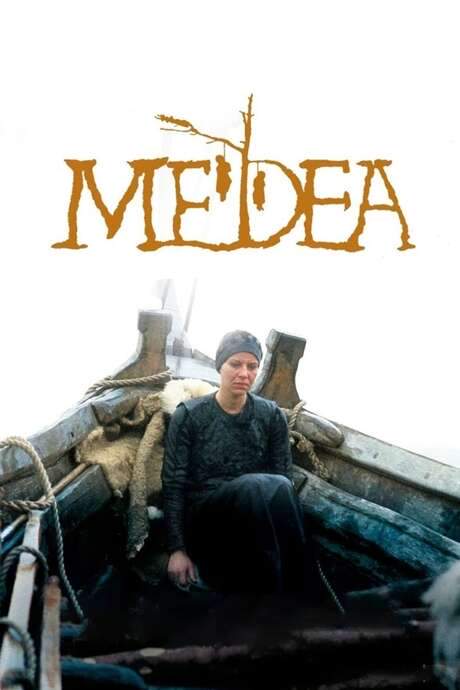
Iphigenia
Year: 1977
Runtime: 127 mins
Language: Greek
Director: Mihalis Kakogiannis
As the Greek fleet prepares to sail for the Trojan War, the winds remain stubbornly still. King Agamemnon, hoping to secure better provisions, accidentally kills a deer sacred to the gods. Angered, the deity demands a tribute, forcing Agamemnon to sacrifice his daughter Iphigenia before the ships can depart.
Warning: spoilers below!
Haven’t seen Iphigenia yet? This summary contains major spoilers. Bookmark the page, watch the movie, and come back for the full breakdown. If you're ready, scroll on and relive the story!
Iphigenia (1977) – Full Plot Summary & Ending Explained
Read the complete plot breakdown of Iphigenia (1977), including all key story events, major twists, and the ending explained in detail. Discover what really happened—and what it all means.
Set on the eve of the Trojan War, the film opens with Helen’s flight to Troy with Paris, thrusting the Greek kings and their allies into a desperate mission. The Greek king Menelaus and his brother, Agamemnon, rally a vast fleet at Aulis to retrieve her, while the soldiers grow restless, hungry, and eager for a conclusion to the long wait.
In an attempt to calm the gathering anxiety, Agamemnon allows a breach of Artemis’s temple law: sheep are taken and the sacred deer is killed in the temple precinct. The act provokes Artemis’s wrath, and the high priest, Calchas, brings a dire oracle to the council. The omen from Artemis herself is clear: a sacrifice must be offered to atone for the defilement of the holy ground and the stag’s death, and the price is steep. The sacrifice demanded is Agamemnon’s first-born daughter, Iphigenia, a revelation that shocks the assembly and darkens the horizon of the campaign.
Amid the growing suspense, Agamemnon drafts a letter to his wife, Clytemnestra, asking her to send Iphigenia to Aulis under the pretense of arranging a marriage between the daughter and the renowned Achilles. Yet Clytemnestra chooses to accompany them, stepping into a trap of her own making as she witnesses the unfolding tragedy from the inside. The news of the “wedding” soon spreads, and the uneasy alliance begins to fracture as old loyalties collide with a grim fate.
As the plot thickens, Agamemnon confesses his deception to a trusted old servant, only to have the information intercepted by Menelaus’s crew. A fierce debate erupts between the brothers: Menelaus condemns the plan as a betrayal of Greece’s honor, while Agamemnon argues that no cause—no war—should demand the life of a child. The clash reaches a tipping point, and the decision seems made by fate itself. Yet Agamemnon steels himself for the forthcoming ordeal as the winds begin to shift.
At Aulis, the tension erupts into a tense, almost ceremonial, truth-telling. Clytemnestra arrives filled with joy over the impending nuptials, but the moment is poisoned by the grim knowledge of what the gathering truly entails. The first true confrontation between father and daughter is a devastating paradox: they speak the same words, but their meanings lie on opposite ends of a brutal moral line. Achilles, whom the assembly believes will wed Iphigenia, becomes a figure of mixed emotion—pride and shame—upon learning the deception that has woven him into a trap.
Odysseus then takes action, exposing the grim truth to the army and raising the stakes even higher. The revelation cannot be undone, and the pace accelerates toward an inexorable end. Iphigenia, though she briefly escapes, is soon captured and brought back to the camp. In a moment that echoes the earlier sacrilege, she is led toward the hillside where the ritual will take place, while her father watches from below with a blend of determination and despair that only a parent pressed by impossible choices can summon. The final farewell between father and daughter is heart-wrenching, as the sacred hill becomes the stage for a confrontation that will seal the fate of more than one life.
As the wind builds, Agamemnon makes a last, doomed ascent toward the summit, his soldiers already moving toward the shore to set sail for Troy. The sacrifice proceeds, the skies answer with a growing gale, and the fleet pushes off into the sea, bearing Greece toward wealth and glory—at a terrible cost.
From now on, fate rules. Not I.
Last Updated: October 09, 2025 at 09:18
Explore Movie Threads
Discover curated groups of movies connected by mood, themes, and story style. Browse collections built around emotion, atmosphere, and narrative focus to easily find films that match what you feel like watching right now.
Mythological Tragedies Like Iphigenia
Mythological stories where gods and fate dictate a bleak human destiny.For viewers who appreciated the classical tragedy of Iphigenia, this section features movies like it that draw from ancient myths. These stories often explore themes of fate, divine intervention, and heavy moral choices within a grand, historical setting, resulting in a similarly dark and emotionally weighty experience.
Narrative Summary
Stories in this thread typically follow a linear, fatalistic arc where a protagonist's actions, often against a divine decree, lead to an inevitable and tragic conclusion. The narrative tension comes not from surprise, but from the dreadful anticipation of a known, bleak outcome, emphasizing the powerlessness of individuals against gods or destiny.
Why These Movies?
Movies are grouped here for their shared foundation in ancient myths, their focus on ceremonial and tragic tones, and their exploration of profound themes like fate versus free will. They create a specific, immersive experience of classical storytelling with high emotional stakes and dark conclusions.
Movies About Impossible Choices Like Iphigenia
Stories centered on a single, heart-wrenching decision with devastating consequences.If you were captivated by the agonizing decision at the center of Iphigenia, this collection features similar films built around unbearable moral dilemmas. These stories create intense suspense and emotional weight by forcing characters into situations where every choice leads to tragedy, resulting in a dark and thought-provoking watch.
Narrative Summary
The narrative pattern involves introducing a central, morally fraught choice early on, then methodically exploring its implications and the psychological toll on the decision-maker. The plot builds towards the inevitable execution of the choice, focusing on the emotional devastation and ethical fallout rather than providing a happy resolution.
Why These Movies?
These films are united by their core structure: a narrative driven by a single, devastating ethical conflict. They share a high-intensity, suspenseful mood, a steady pace that amplifies dread, and a bleak emotional landscape, making them cohesive for viewers seeking this specific type of dramatic tension.
Unlock the Full Story of Iphigenia
Don't stop at just watching — explore Iphigenia in full detail. From the complete plot summary and scene-by-scene timeline to character breakdowns, thematic analysis, and a deep dive into the ending — every page helps you truly understand what Iphigenia is all about. Plus, discover what's next after the movie.
Iphigenia Timeline
Track the full timeline of Iphigenia with every major event arranged chronologically. Perfect for decoding non-linear storytelling, flashbacks, or parallel narratives with a clear scene-by-scene breakdown.

Characters, Settings & Themes in Iphigenia
Discover the characters, locations, and core themes that shape Iphigenia. Get insights into symbolic elements, setting significance, and deeper narrative meaning — ideal for thematic analysis and movie breakdowns.

Iphigenia Spoiler-Free Summary
Get a quick, spoiler-free overview of Iphigenia that covers the main plot points and key details without revealing any major twists or spoilers. Perfect for those who want to know what to expect before diving in.

More About Iphigenia
Visit What's After the Movie to explore more about Iphigenia: box office results, cast and crew info, production details, post-credit scenes, and external links — all in one place for movie fans and researchers.

Similar Movies to Iphigenia
Discover movies like Iphigenia that share similar genres, themes, and storytelling elements. Whether you’re drawn to the atmosphere, character arcs, or plot structure, these curated recommendations will help you explore more films you’ll love.
Explore More About Movie Iphigenia
Iphigenia (1977) Scene-by-Scene Movie Timeline
Iphigenia (1977) Movie Characters, Themes & Settings
Iphigenia (1977) Spoiler-Free Summary & Key Flow
Movies Like Iphigenia – Similar Titles You’ll Enjoy
Troy (2004) Full Summary & Key Details
Helen of Troy (1000) Spoiler-Packed Plot Recap
Phèdre (2003) Film Overview & Timeline
Electra (1990) Full Summary & Key Details
Arion (1986) Plot Summary & Ending Explained
Medea (1988) Film Overview & Timeline
Medea (2021) Detailed Story Recap
Electra (1962) Movie Recap & Themes
The Daughter of the Sun (1971) Movie Recap & Themes
The Trojan Women (1971) Full Movie Breakdown
Medea (1969) Plot Summary & Ending Explained
Young Aphrodites (1963) Story Summary & Characters
The Fury of Achilles (1962) Full Movie Breakdown
The Lion of Thebes (1964) Film Overview & Timeline
Electra, My Love (1974) Ending Explained & Film Insights










































